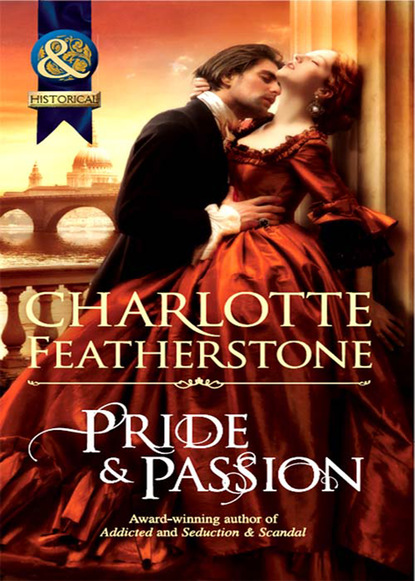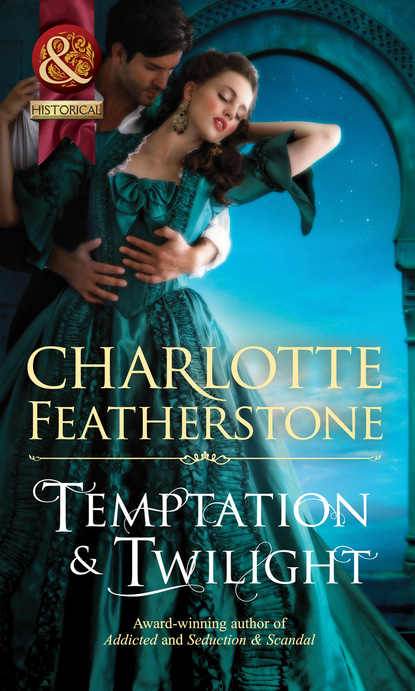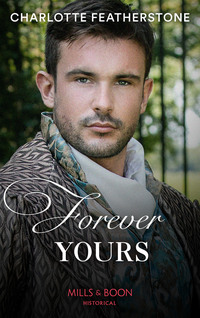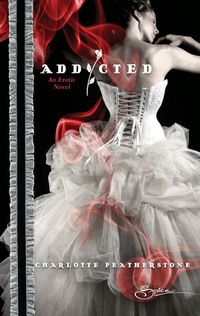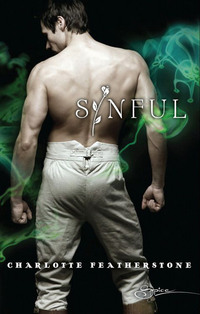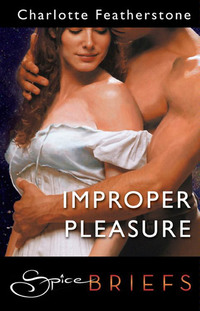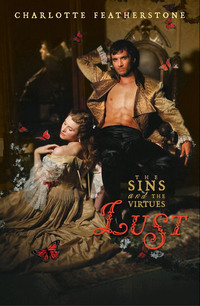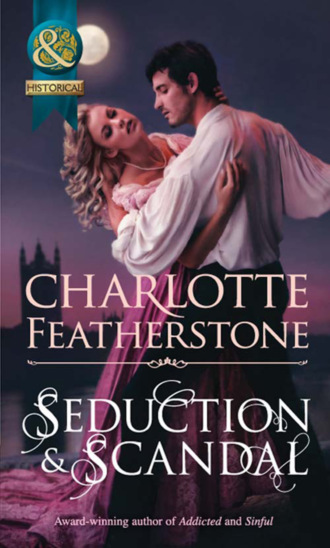
Полная версия
Seduction & Scandal
Lucy must have known her thoughts, for she kept her lips pressed firmly together as she toyed with an imaginary speck of lint on her skirts.
“I wonder what Lord Black is playing at, sponsoring Mr. Knighton?”
Isabella took a sip of her tea. “Perhaps he is just being kind, Luce. Not everyone has ulterior motives.”
Lucy’s gaze met hers. “Think back to our conversation last night, Issy. Did I not tell you that Black would not be deterred?”
“Deterred from what?”
Like a sly kitten, Lucy smiled. “You know very well from what.”
“In fact, I don’t. What is it you’re trying to say?” Isabella asked, irritability making her voice sharper than she intended. The mild headache she had been suffering under all morning became a loud and painful throbbing. Now she knew for certain, it was one of those headaches, she thought. Rubbing her temple, she tried focusing on her cousin.
“What I am trying to make you see, dear Issy, is that Black has just removed an obstacle.”
Isabella dropped her hand from her temple. “I beg your pardon? I’m not following your line of thinking.”
“He has removed Knighton from your side, and quite effectively, in fact, for Mr. Knighton will be studying for weeks to make it through the first degrees, thereby leaving you alone, and available for the evenings.”
The door opened, thankfully relieving Isabella of the task of rebutting Lucy’s wild suggestion. Stonebrook’s butler, Jennings, appeared, his face austere and wrinkled. He was ancient and frightfully proper. Isabella had been terrified of him when she had first come to live with Lucy and her father. But since that time, she had softened to crusty old Jennings.
“For you, miss.”
Jennings presented a silver salver with one perfect bloodred bloom, with an ivory card attached to the stem by a black satin ribbon.
“For me?” she asked, even though she could read quite clearly that the card had her name written on it, in bold, black lettering.
“Indeed,” Jennings murmured.
“Thank you,” she returned as she lifted the delicate flower from its resting place. Oh, it was perfect. And the sender had removed the leaves and thorns as well.
Jennings departed, and with a quick glance at her cousin, who was pressing forward in her chair, Isabella turned the card over and noted that there was no seal imprinted on the wax. The only thing keeping the edges together was a large blob of black wax.
“Well?” Lucy asked. “I can hardly bear the suspense, Issy. Open the blasted thing.”
“Your language,” Isabella reprimanded her, feeling every bit as anxious as Lucy.
“Oh, get on with it,” Lucy commanded. “It’s only you and I, for mercy’s sake.”
The wax seal broke, and she opened the card to more of the elegant black script.
‘Tis the last rose of summer
Left blooming alone;
All her lovely companions
Are faded and gone;
No flower of her kindred,
No rosebud is nigh
To reflect back her blushes
To give sigh for sigh.
I dreamed of your sighs last night, Isabella—a most haunting, beautiful sound that I hope, most fervently, I might hear again very soon.
Your servant, Black
Isabella tried to hastily fold the card before Lucy could read it. But her cousin was too quick, and managed to read Lord Black’s missive before she could hide the card.
“Well,” Lucy drawled with amusement, “how could Lord Black know that you have a fondness for Thomas Moore’s poetry?”
Puzzled, Isabella looked up at her cousin. “I don’t know.”
With a smile Lucy breezed past her then stopped at the door. With a glance over her shoulder, she said, “You know, Issy, I would bet my dowry that Lord Black would not command you to see to your own amusement in the evenings—not like Mr. Knighton. Something tells me that Black would keep you exceedingly busy, and delightfully amused, all night long.”
CHAPTER FOUR
PALL MALL AND COCKSPUR STREETS were bustling with trade. Elegant carriages transported the rich and fashionable down the cobbles for an afternoon of shopping, while wooden carts carrying fresh vegetables and apples wound their way to Covent Garden where the goods would go up for sale in the market.
On the sidewalks, people walked shoulder to shoulder, some in a hurry to carry out their business, others at a more leisurely pace, stopping occasionally to peer into a shop window or to purchase a newspaper from one of the many young boys selling them on the street corners.
“Wolf escaped from London Zoo! Still at large!” called one such boy as Isabella passed him.
“Mystery in Spitalfields!” cried another. “Bodies found murdered! Read all about it in the Standard!”
Pressing on, Isabella ignored the chilling headlines of the day and continued down Cockspur Street to Jacobson’s, the preeminent apothecary in London. Her headache would not give up, not even after a pot of tea and a nap. When she’d left the house, Lucy was still napping, so Isabella had taken a footman with her. The footman, Isabella noted, was lingering behind, talking to a buxom shopgirl who was trying to sell the young man a haunch of pork—and other wares, Isabella was certain. It didn’t matter that she was getting farther and farther away from him, for her head was throbbing, and the smells of the city were beginning to nauseate her. She needed that medicine, the only tonic that had been able to cure the headaches and stem the dreams.
Oh, how she hated to think of them coming back. They’d been gone for months now. She’d thought herself cured. How very distressing to know she wasn’t. She’d had one of those disturbing dreams that very afternoon, during her nap. It was upon awakening that she realized the dreams had only been on hiatus—not banished. She knew then that she must come to Jacobson for more of the tonic.
“Women gone missing from the Adelphi Theatre,” a boy called as he rang his bell. A group of gentlemen stopped and clustered around the lad for a look at the day’s headlines. The boy held out an issue of the Times to her when he saw her standing on the sidewalk, attempting to move around the group of men. “Read all about the Adelphi mystery in the Times, miss.”
Reaching into her reticule, Isabella removed a shilling and gave it to the lad.
“Thank you, miss,” he said, his eyes growing round. “‘Ave a good day.”
Nodding, she accepted the paper from the boy and unfolded it. Scanning the headlines, she read the blurb of the actresses who had gone missing from the Adelphi, the notorious music and dance hall.
The ladies were last seen in the company of a tall gentleman, his features concealed by the brim of his top hat. An eyewitness observed the ladies being ushered into a black town carriage driven by four black horses …
The Earl of Black had such a carriage, which was drawn by four magnificent warmbloods the color of midnight. The thought stopped her cold. Lucy had mentioned seeing Black leave his town house late at night … the very night, in fact, that the women were seen getting into the carriage.
Nonsense. Black was a refined gentleman. What in the world would he be doing with three women whose reputations were dubious at best? Women were always missing from the Adelphi, and more often than not showed up months later after a sojourn in the country and with a child on their hip.
Silly, overactive imagination, she admonished. At times it could be such a nuisance. And yet, an image of her and Black dancing whisked through her mind, paralleling the opening of her book. They shared the same eyes, Black and her image of Death. As well, they both embodied the blood-heating characteristics of mystery, danger and a luring sensuality. And that, she thought with a little shake of her head, was the most preposterous thought of all.
Folding the paper in half, Isabella tucked it under her arm and continued walking. The three actresses, if they could be called such, were probably listing away as mistresses to some rich man. Everyone knew that the music hall was as infamous for its debauches as it was its musical performances. Still, the streets of London were getting more dangerous …
She rounded the corner of Cockspur and crossed onto Haymarket where stood a short, round man on a box, soliciting interest in an illusionist. She glanced to where a crush of people were gathered around a man standing beside a coach that reminded her of a gypsy’s caravan.
“Step inside and witness for yourself the mystery of Herr Von Schraeder. Come, come,” he said, waving them closer. “For a crown you can witness all the magic.”
Her gaze drifted over the crowd, then down the street that led to the Strand. The Strand was packed with tourists and young men vying for tickets to the numerous theaters and music halls that lined the street. The crowd was turning rowdy—this wasn’t the fashionable part of Mayfair where everything was polite and orderly. This was the gray area of London where the posh West End melted into the slums of the East End.
With the days turning shorter and the nights longer, Isabella reminded herself that it would not do to stand idle and woolgather. She needed to retrieve her medicine and return to Mayfair before dusk. And by the look of the cloud-covered sky, dusk would be arriving far sooner than usual.
Turning away, she stepped onto Haymarket Street, stopping abruptly when she saw a tall man, dressed in black, leaning leisurely against an ebony-and-silver-in-laid walking stick, obstructing her path. He was watching her over the rims of his blue sunshades. She could not help but shudder at the intensity of that unblinking gaze. Or wonder why he was wearing them when there was no longer any sunshine.
“Good day, Miss Fairmont.”
Lord Black.
“Oh, good day, my lord. I did not recognize you with your sun spectacles.”
He smiled as he took her hand, his gaze catching hers over the silver rims of the lenses. “I will forgive you this time,” he teased, bringing his lips to brush against her gloved hand.
“Are you enjoying the autumnal weather?” she asked. “Or are you by chance hanging about for a chance to witness Herr Von Schraeder’s magic show?”
His pupils grew large, engulfing the pale blue of his iris. He blinked, then hid his eyes from her behind the dark lenses of his spectacles. His body appeared stiff now, and he seemed to be watching her curiously.
She was about to speak, when she was jostled by a pack of young men running past her as the Adelphi opened its doors for business. She was pushed into Black’s chest, and he caught her, wrapping his arms tightly around her waist to keep her from falling.
When the ruffians had passed, he slowly released her, and she looked up into his face, which showed none of the lightness that had been there when she first saw him. He was back to being a mystery—a beautiful one.
Pulling back, she put distance between them. Discretion, she reminded herself. It would be so easy to find herself failing against him, and the seductive lure he cast—Isabella couldn’t lie—she was already weakening. Her mother had been weak, and her father had taken advantage of the fact.
“My lord, you were saying?”
“Unless Herr Von Schraeder’s magic is exceptionally potent, I believe the citizens of London have seen the last of him,” he muttered, guiding her with a hand on the small of her back, to the safety of the apothecary’s storefront.
“What do you mean, sir?” she asked. As she looked over her shoulder at the cart, she saw Herr Von Schraeder’s assistant come flying out, bellowing something.
“I believe it was the apothecary you were seeking,” Black replied as he pulled open the door and ushered her through. The bells tinkled, drowning out the rest of the assistant’s words as he ran from Von Schraeder’s cart.
“How did you know I was coming here?” she demanded, her gaze narrowing, just as a fresh flush of gooseflesh erupted on her skin.
“Jacobson’s apothecary is most famous. I guessed that perhaps it was him that brought you to this side of the city.”
“Oh.” She flushed and looked down at her gloved fingers, which were wrapping around the braided cording of her reticule. “Forgive me, my lord, if I seemed short just now. I have a terrible headache, I’m afraid.”
Pulling his spectacles from his face, he caught her chin in his gloved hand and angled her face to the waning afternoon light that filtered in through the large window of the apothecary.
“You’re pale, Miss Fairmont. I don’t like it.”
“Well, I can’t help it,” she snapped, not knowing whether to be touched or embarrassed by his frankness.
“It worries me to see you suffering,” he murmured, his thumb grazing against the apple of her cheek. “Is there anything I might do to relieve you of it?”
She was touched. Not only by his words, which seemed to be spoken without artifice, but also by the concern she saw in his eyes. “No, my lord. I’ve tried everything, and nothing seems to relieve it, except for Mr. Jacobson’s wonderful bergamot tonic.”
Two elderly matrons waiting at the counter were watching them with unconcealed interest. Black dropped his hand at the same moment Isabella took a discreet step back.
“I will drive you home,” he announced.
“Oh, no, I’ve brought a footman with me. He’s …” Isabella peered through the gold-foil lettering on the window, grateful to see that the young man was still flirting with the shopgirl. “He’s right over there.”
Black followed the direction of her hand. “He seems rather inept in his duty of watching out for you, Miss Fairmont. No, I will see you returned safely home.”
“Ah, good day, Miss Fairmont,” Mr. Jacobson’s son, George, called from behind the counter. “What brings you here today?”
“Good day to you, Mr. Jacobson,” she returned, even as she stole a glance at Lord Black. Who, she was startled to discover, was watching her intently from behind the rims of his spectacles, which he’d put back on.
She really rather liked him in those, she mused, despite the fact it was no longer sunny.
Wiping his hands on his apron, George asked, “Another sleeping tonic, by chance?”
“Yes. Please.”
“A tincture of laudanum and bergamot, alongside a dose of the valerian herb?”
“That’s right.”
Black’s expression was as dark as his name and he was watching her with unrelenting curiosity.
“That is a very dangerous concoction, Isabella,” he whispered into her ear. “Very dangerous.”
“I’m aware of that, but I’m very careful to measure it out exactly as Mr. Jacobson prescribes.”
He turned her face to his, his fingers resting beneath her chin. “Do you know how many lives Death has claimed after taking tonics like this? Thousands, Isabella.”
She shivered. “I know what I am doing. I suffered almost daily for nearly a year with these headaches, and … dreams,” she whispered before hurrying on. “I’m quite able to follow a prescription, my lord. I’m not a child. And furthermore it is the only thing that has helped.”
“Here ye are, Miss Fairmont. Two spoonfuls at bedtime ought to do the trick. And if you find you’re not resting well, take one during the daytime.”
Reaching into her reticule, Isabella pulled out some coins and set them on the counter. “Thank you, Mr. Jacobson.”
He nodded and came around the counter, holding open the door to her. “Good day, Miss Fairmont.”
Sweeping out onto the sidewalk, Black moved in to stand beside her. The sidewalk was bustling, and she was bumped from behind by a steely body. The bottle of medicine fell from her grasp, only to be caught in the palm of a black-gloved hand.
Black.
Straightening, he held out his hand where the bottle of medicine was cradled in his palm. “I should have let the bottle smash onto the street, but then you would only have gone back inside and ordered another one. Wouldn’t you?”
“Yes, I am afraid I would. I am desperate after all. I’ve had this headache since last night, ever since I returned from the maze—” She stopped, embarrassed to have mentioned what happened between them. She didn’t finish her thought, and instead shoved the bottle into her reticule.
He watched from behind his spectacles, and Isabella felt his eyes burning through her clothes and skin until they pierced the very soul of her. Was he also recalling what had transpired between them? Had he been as affected as she?
Ridiculous, she chided. She mustn’t let her thoughts stray into that dangerous territory. Passion was for novels. Not her life. What was it about this man that made her forget her own mantra?
Taking a step back, she prepared to part from him, but he reached for her elbow and held her. “My carriage is just around the corner. Allow me to see you safely home. You, there, boy,” Black called as the newspaper boy who had sold her a copy of the Times ran past them. The lad stopped, his cheeks bright red, his blue eyes gleaming.
“Did ye hear, me lord, that Herr Von Schraeder is dead! Dead!” the boy cried. “I’ve got to be the first to make it back to the offices. A whole pound if I’s the first to break a news story, and it’s no secret that the sham magician was not liked. What if it were murder?” the lad crowed with enthusiasm. “I bet they’d pay me more than a pound if he were done in.”
Black pulled him back by his collar. “I’ll give you a fiver if you would be so kind as to cross the street and give this to that man in the blue-and-white livery.”
“The man talking with Sally?” the boy inquired.
“That’s the man.” Black handed the boy his calling card. “Tell him that I have Miss Fairmont and I will be bringing her home. She’s not well. Be quick about it,” Black demanded as he slipped the boy a five-pound note. “And see that the task is done before you go screaming in the streets of Von Schraeder’s murder.”
“Right away, my lord.” The boy grinned, then ran as fast as his thin little legs would carry him.
“This way, Miss Fairmont,” Black commanded, as he took her arm and walked with her around the corner of the apothecary to his waiting carriage.
“What did that lad mean that Von Schraeder was dead?” she asked. When he stopped beside her, Isabella was forced to glance over her shoulder. Black was staring at something, but what?
“My lord?” It appeared to her that he was staring at the Adelphi Theatre and his complexion had grown quite ashen. “Black, is something amiss?”
Shaking his head, she saw his gaze rove over the theater before he tore it away and looked down upon her. “Nothing at all, Miss Fairmont. Shall we?”
Reaching for the carriage door, he opened it, then motioned her forward. Inside, it was dark, the upholstery a luxurious black velvet that lent the carriage a rich, relaxing air.
“Lord Black,” she insisted, but he put a finger to her lips, silencing her. “This really isn’t necessary.”
“Shh,” he murmured. “You mustn’t tax yourself.”
“I’m neither a child nor an invalid,” she chastised. “I merely have a headache.”
“A devil of one if you’ve resorted to valerian and opium.”
There was nothing to do but accept his hand as he helped her up the iron steps. His hand felt large and warm in hers—strong—and Isabella closed her eyes, allowing herself a brief moment of sensation to absorb his touch and the feel of his hand engulfing hers. She’d never felt her hand pressed strongly in another’s. The experience was at once comforting and arousing, making her wonder where else on her person his hands would feel as wonderful.
“Isabella? Are you unwell?”
“No,” she gasped, realizing she was standing on the steps holding Black’s hand. “No, I … my hem was caught, that is all.”
Ninny, she scolded herself as she sat upon the empty bench. What must he think of her? Did he think her a silly child? She was certainly acting like one.
Black shouldered his way into the carriage and took the opposite bench. His long legs stretched out, his thighs outlined in his trousers, his shoulders taking up most of the space on his bench. Dropping her gaze to her lap, she flatly refused to look at him, sprawled out in masculine lassitude.
With a rap of his walking stick on the ceiling of the carriage, the coach lurched forward, and soon they were making slow but steady progress back up the Strand and toward Grosvenor Square.
She felt nervous and fidgety. The silence was almost unbearable, yet she did not know how to begin the conversation. She could hardly remark upon the weather, for it was gray and dreary, the autumnal sky heavy with the promise of a storm. Nor could she mention anything about last evening, when she had been most unladylike to sit in the dark, all alone, with him.
However the silence affected her, it had the opposite effect on his lordship. He was a man who was at ease with silence—and solitude. Black did not feel the need to fill the quiet with useless chatter. She did not have to be well acquainted with the earl to know this about him.
He wore the quiet like a shroud—unmoving, soundless, becoming one with it as it blanketed the luxurious interior of the coach. It unnerved her the quiet that hovered between them. Not because she feared it, but because it felt too intimate. She could hear his slow, steady breaths, could hear her own. There was a sensuality to it, the resonance of air whispering past their lips. Without words, they were alone with their thoughts, the images in their minds. The picture in Isabella’s mind was that of her hand in Black’s, and how it would feel to experience the brush of his thumb inside her palm. The pleasure of awaiting his kiss as he lowered his mouth to hers.
No, the quiet was far too intimate, and her thoughts much too reckless.
His leg moved, his booted foot brushed against the hem of her day gown, and she swallowed—averting her gaze, allowing it to roam the carriage—anywhere, as long as it was not lingering on him, or the imagery her mind wished her to acknowledge.
She was a sinful creature to be thinking such thoughts! She had been given the opportunity that many of her sort never had. She’d been gifted with the chance to live as a lady, and here she was, thinking base, depraved thoughts and succumbing to the lure of pleasure just like her reckless parents.
She must put an end to this. Unable to withstand the silence—and her own wayward thoughts—Isabella said the first thing that came to mind.
“I received your note this morning.” He glanced at her sharply, but said nothing. It was a dim-witted thing to have said. She should never have opened up this conversation, but it was done, and she was committed now. “Thomas Moore’s poem is one of my favorites. I can recite it from memory.”
“Can you?”
“The last verse of Moore’s poem is, in my opinion, the best. ‘So soon may I follow when friendships decay, from love’s shining circle the gems drop away. When true hearts lie withered and fond ones are flown, Oh! Who would inhabit this bleak world alone?’”
Slowly he turned to look at her. “You’re a romantic.”
Isabella felt her cheeks flame scarlet. “Yes. But what woman is not, my lord? I think you’re a romantic as well.”
“And what makes you say that?”
“You removed the thorns from the rose you picked for me.”
He inclined his head, then averted his gaze on the window, fixing on the scenery that was passing slowly by. He declined further comment, and it made Isabella wonder if he had grown uncomfortable with the familiarity of their conversation. For certain, his quiet contemplation unnerved her. They were back to silence, and the intimacy was a living breathing thing—a pulsation—that throbbed with each of their breaths, their heartbeats.
Isabella could hardly stand it. But Black appeared to be unaware of the rippling current that simmered between them.


